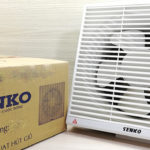Many people are unsure whether to choose an evaporative cooler, air cooler, or air conditioner to save money. However, these three types of cooling appliances have their own pros and cons, so it’s essential to understand them before making a decision.
1 Evaporative Cooler Working Principle
Working Principle
Evaporative coolers work based on the principle of natural water evaporation to provide moisture using membrane permeation and shaft winding technology.
This technology absorbs heat from the evaporation effect of water absorbed on the cooling pad, which is then drawn up by the shaft winding and blown out by the fan. This moist air helps lower the temperature of the surrounding environment.
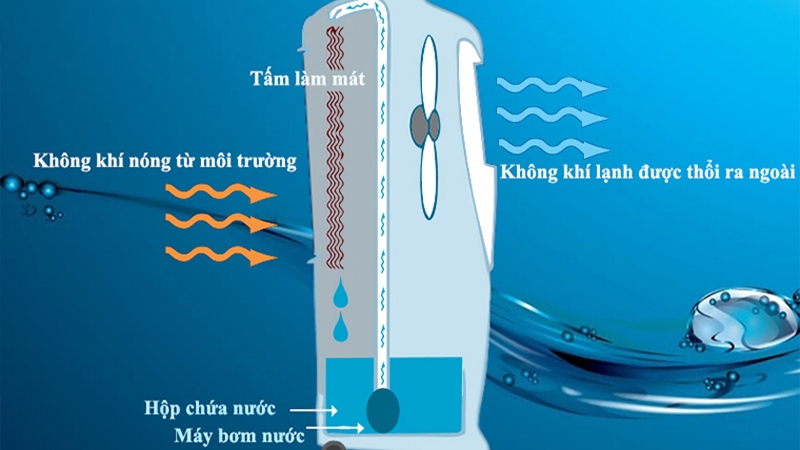 Evaporative Cooler Working Principle
Evaporative Cooler Working Principle
Advantages of Evaporative Coolers
-
No additional installation costs; just plug and use
-
Low power consumption for energy savings
-
Portable and easy to move around
-
Moist cooling prevents dry skin
-
Offers multiple functions: mist spray, humidification, ion generation, bacteria filtration, etc.
-
Can be easily moved to cool different areas
Disadvantages of Evaporative Coolers
-
Small operating range of 15-30m; cannot cool an entire room
-
Use of evaporative coolers can cause dampness and mold on objects in the room, potentially causing damage
-
Cooling capacity decreases over time as humidity increases but temperature remains unchanged
-
Slow cooling process
2 Air Conditioner Working Principle
Working Principle
Air conditioners cool by using electricity to change the room temperature according to the user’s needs. Specifically, it works through the following steps:
Step 1: After passing through the expansion valve, the refrigerant gas will have low pressure and temperature.
Step 2: The refrigerant absorbs heat from the surrounding environment as it passes through the evaporator. The indoor fan draws in the room’s warm air, pushes it through the evaporator to cool it, and then returns it to the room.
Step 3: The heated refrigerant is then sent to the compressor, where it is compressed to a higher pressure.
Step 4: The high-temperature, high-pressure gas is then passed through the condenser to be cooled by the fan and aluminum fin heat sink. As it passes through the condenser, the refrigerant’s temperature decreases.
Step 5: The refrigerant is then sent back to the expansion valve to reduce its pressure and temperature, starting a new cycle.
 Air Conditioner Components
Air Conditioner Components
Advantages of Air Conditioners
-
Quick and even cooling for the entire room
-
Many inverter models help save energy
-
Offers unique modes: mosquito repellent, skin hydration, comfortable wind mode, night mode, quiet mode, etc.
-
Long-term use does not affect surrounding electronic devices
-
Cooling capacity is not affected by the external environment
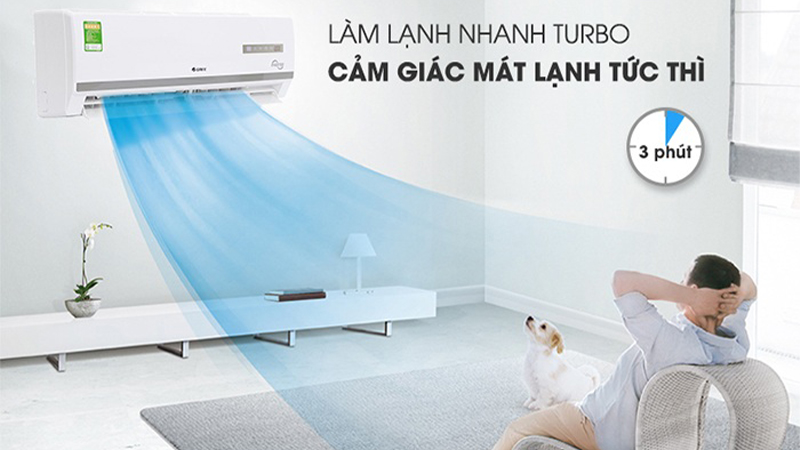 Air Conditioners Cool Down Quickly
Air Conditioners Cool Down Quickly
Disadvantages of Air Conditioners
-
Initial and ongoing installation and maintenance costs
-
Works best and saves energy when used in a sealed room
-
Fixed installation; cannot be moved
3 Air Cooler Working Principle
Air coolers, also known as air conditioners, evaporative coolers, or air purifiers, are popular among families during hot weather.
Working Principle
Air coolers work on the principle of natural water evaporation, similar to the evaporation process in ponds, lakes, rivers, and streams.
The specific working principle is as follows: When the cooler is turned on, warm air from the surroundings is sucked into the cooler from all directions, passes through a dust filter, and reaches the cooling pad. Here, the cooler’s water pump operates, pumping water from the water tank to wet the cooling pad. Next, the warm air is absorbed by the cooler’s system, and its heat is absorbed by the evaporation effect of water on the surface of the cooling pad.
The incoming warm air can be cooled by 5-15 degrees Celsius (under standard conditions with a temperature above 42 degrees Celsius and humidity between 30-40%).
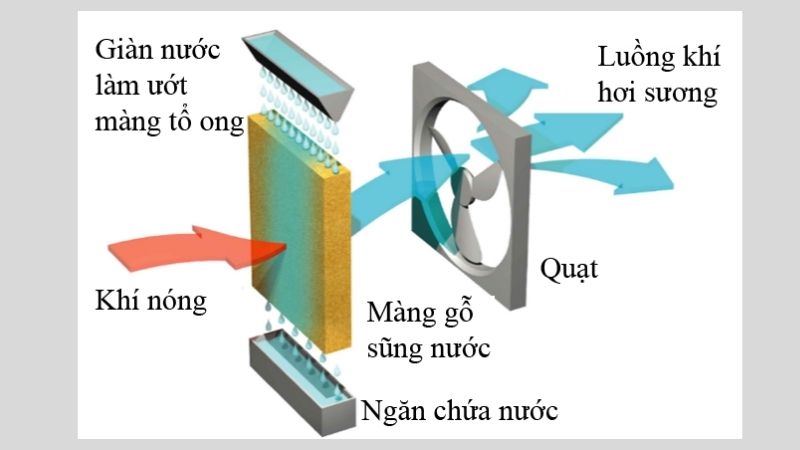 Air Cooler Working Principle
Air Cooler Working Principle
Advantages of Air Coolers
Using an air cooler offers several benefits:
-
Rapid cooling due to its ability to reduce the temperature of incoming warm air by 5-15 degrees Celsius
-
Saves money on the initial purchase and monthly electricity bills
-
Can help balance humidity and purify the air, promoting health
-
Easy to disassemble and clean at home
Disadvantages of Air Coolers
Some significant drawbacks of air coolers include:
-
Loud operating noise
-
Cooling capacity is influenced by the surrounding environmental temperature
4 Evaporative Cooler or Air Conditioner: Which is More Economical?
Considering the pros and cons mentioned above, you can assess your needs and budget to choose a cooling appliance that suits your preferences and budget.
If you need to quickly cool a closed space and create a pure and elegant atmosphere, an air conditioner is a good choice.
On the other hand, if you’re looking for an affordable, portable cooling solution that can be moved around to cool different areas, an evaporative cooler is a sensible option.
 Choose According to Your Needs
Choose According to Your Needs
5 Air Cooler or Air Conditioner: Which is More Economical?
Considering the pros and cons of air coolers and air conditioners, you can now make an informed decision based on your family’s needs and circumstances.
An air cooler is suitable for open spaces and can be moved around flexibly, unlike a fixed air conditioner. Additionally, air coolers can prevent dry air, which is a common issue with air conditioners.
Air conditioners are designed for closed spaces and offer deep and rapid cooling. They allow you to set a specific temperature and operate quietly without a loud motor.
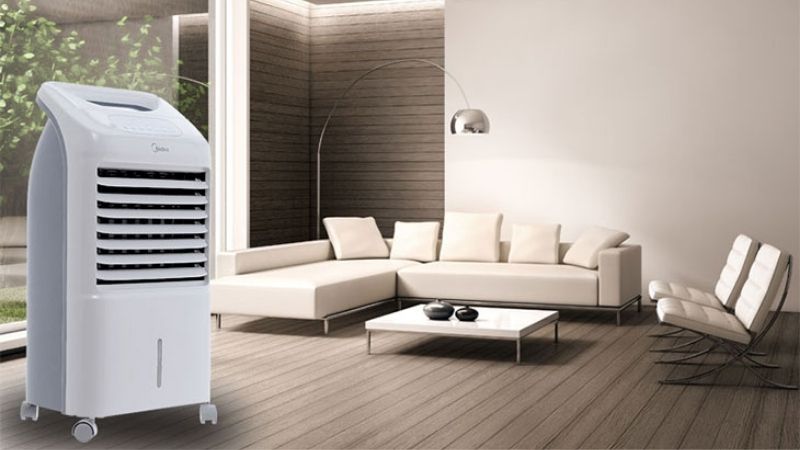 Air Coolers Suit Open and Spacious Areas
Air Coolers Suit Open and Spacious Areas
In conclusion, this article has provided an overview of evaporative coolers, air coolers, and air conditioners, highlighting their working principles, pros, and cons. We hope it helps you make an informed decision when choosing a cooling appliance that suits your budget, brand preferences, and quality expectations.
Gas Pump Cleaning Service Available at Dien May XANH for Air Conditioners, Washing Machines, and Fans
Is your air conditioner, washing machine or fan not cooling as it used to be? Dien May Xanh has announced a nationwide gas pump service and cleaning for these appliances, so make sure to book your appointment today and get them running optimally again!
Exploring the Pros and Cons of Sleeping in an Air-Conditioned Room
Is sleeping with an air conditioner a good idea? As concerns over the adverse effects of air conditioning on our health increase, it’s important to understand the risks and rewards of using air conditioning while sleeping. Let’s examine the benefits and drawbacks of sleeping with an air conditioner, and the protective measures one should take.
How to Maximize Air Conditioning Comfort for Babies in the Home
Having a new baby in the home brings many considerations and responsibilities, none more important than making sure the baby is safe and healthy. One way to achieve this is proper air conditioning usage. Read on for helpful tips on how to make the best use of air conditioners to keep your newborn safe.


























